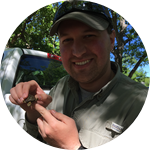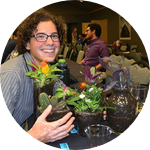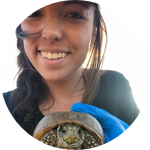About This Project
I'm studying amphibian communities in the Southern High Plains of Texas. Amphibian species in the region rely on shallow, depressional wetlands known as playas. Changes in amphibian communities often warn of surface water pollution that could potentially have implications for human health. I hypothesize that proximity to agricultural operations will decrease wetland habitat quality, species richness, and relative abundance, as well as increase rate of abnormalities within communities.
Ask the Scientists
Join The DiscussionWhat is the context of this research?
The purpose of this study is to improve conservation of wetland ecosystem services by using amphibians as indicators of wetland function in an agricultural region. I will investigate how proximity to agricultural operations impacts amphibian communities in the Southern High Plains (SHP) region of Texas. The SHP is home to over 30,000 shallow, depressional playa wetlands and 14 amphibian species that rely on healthy, functioning playas for breeding and aquatic habitat for tadpoles. These wetlands are located in a region with some of the highest agricultural production in the United States. An unintended byproduct of these operations can be reduced surface water quality via inputs of nutrients and contaminants which can negatively affect amphibian communities and wetland function.
What is the significance of this project?
Amphibians can function as bioindicators due to their permeable skin and complex life cycle – using both terrestrial and aquatic habitat. The aquatic tadpoles are especially useful in assessing water quality issues. Previous research has largely focused on fish, but fish do not naturally occur in the ephemeral playas which only fill after heavy rains. Functioning playas support communities of organisms requiring aquatic habitat as well as providing critical stopover sites for migratory birds. This surface water is necessary for regional game species including quail, pheasant, and deer and provides recreational opportunities for people. Poor water quality can impair ecosystem function reducing the playa’s ability to support biodiversity and human recreation.
What are the goals of the project?
The project goals are to assess current impacts of agricultural operations and provide information necessary to improve playa conservation in the SHP. Specifically, I will investigate how proximity to agricultural operations changes water chemistry and how those changes influences amphibian community composition, reproduction, and physiological health. I hypothesize that wetlands closer to agricultural operations will have reduced water quality that will negatively impact the amphibian community. I will integrate water chemistry analysis, amphibian surveys, field enclosures, and toxicology experiments to test my hypothesis. The project goals will be achieved by determining appropriate wetland buffers and contaminant concentrations that reduce unintended impacts of agriculture.
Budget
Laboratory analysis of hormones in water and sediment are incredibly important for the successful completion of this project. To be able to determine how veterinary pharmaceuticals commonly used in cattle implants are affecting these amphibian communities, I must understand how pervasive these emerging contaminants are throughout the study area. It is my hope that I will have the funding to samples for at least 30 playas per season.
Endorsed by
 Project Timeline
Project Timeline
The first field season is in progress. I've set out song meters at playas throughout the Southern High Plains. I'm pipe sampling after rain events to detect presence of larval amphibians and performing visual surveys to detect adult amphibians. These field activities will persist until mid-August 2019. A 30-day field caging experiment will be performed using one species in late May 2019 and the second species will begin in late July 2019. These field activities will be repeated in 2020.
Jun 17, 2019
Project Launched
Jun 22, 2019
Field Experiment (Species #1) Completed
Jul 17, 2019
Field Experiment (Species #1) specimens cataloged, dissected, and gonads prepped and mounted on slides to determine presence of testicular oocytes
Aug 10, 2019
Field Experiment (Species #2) Completed
Aug 17, 2019
Pipe-Sampling Completed
Meet the Team
Affiliates
Amanda Emert
My name is Amanda Emert, and I was born and raised in Cotton Center, TX. I began my undergraduate career with an appreciation for the natural world and an understanding that healthy, functional playa wetlands are essential to humans and wildlife in the Southern High Plains. I am especially interested in ecology and wetland habitat quality. Outside of my work and educational pursuits, I enjoy hiking, cycling, camping, spending time with my dog and two cats, and anything else that gives me an excuse to be outdoors! My educational interests certainly reflect this fact. I am currently a graduate student at Texas Tech University seeking a M.S. in Wildlife, Aquatic, & Wildlands Science and Management. The focus of my research is amphibian communities in the Southern High Plains. It is my hope that I will be able to play my part in imparting a sense of conservation and sustainability on our future generations.
Project Backers
- 6Backers
- 2%Funded
- $78Total Donations
- $13.00Average Donation



